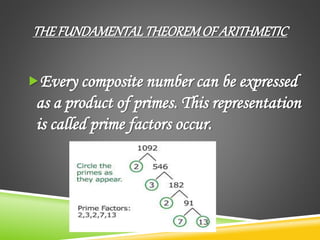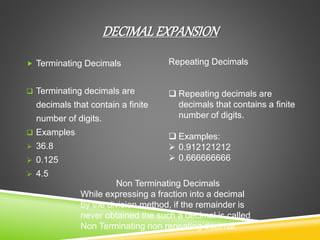Mathematics assignment
- 2. REALNUMBERS We have studied in earlier classes that rational and irrational number taken together form a set of real numbers. It is denoted by ‘R’. This set of real numbers have the following subsets • Natural numbers • Whole numbers • Negative numbers • Integers • Fractional/decimal numbers
- 3. RATIONALNUMBERS Rational numbers are numbers that can be expressed in the form of p/q where q≠0 and p, q are integers. They can be expressed in both terminating repeating rational number and non terminating repeating rational number. They are denoted by Q.
- 4. IRRATIONALNUMBER A number is an irrational number, if it has a non terminating and non repeating decimal representation.
- 5. EUCLID’S DIVISION LEMMA Lemma- a lemma is proven statement used for proving another statement. Euclid’s division lemma states that – For any two positive integers a and b, there exist unique integer q and r satisfying a=bq+r , 0 ≤ r < b. Example : For a=15 and b=3 15=3(5)+0 where q=5 and r=0
- 6. EUCLID’S DIVISION ALGORITHM Algorithm- An algorithm is series of well defined steps which gives a procedure for solving a type of problem. Euclid’s division algorithm can be used to find the H.C.F. of two numbers. It can also be used to find some common properties of numbers. To obtain the H.C.F. of two positive integers, say c and d, with c>d, we have to follow the steps below: Step1: Apply Euclid’s division lemma to c and d. So, we find whole numbers, q and r such that c=dq+r Step2 : If r=0, d is the H.C.F. of c and d. If r does not equal to 0, apply the division lemma to d and r. Step3 : Continue the process till the remainder is zero. The divisor at this stage will be the required H.C.F .
- 7. THEFUNDAMENTALTHEOREMOF ARITHMETIC Every composite number can be expressed as a product of primes. This representation is called prime factors occur.
- 8. The HCF of two numbers is equal to the product of the terms containing the least powers of common prime factors of the two numbers. The LCM of two numbers id equal to the product of the greatest powers of all prime factors of the two numbers H.C.F. (Highest Common Factor) L.C.M. (Lowest Common Multiple)
- 9. RELATIONSHIPBETWEENH.C.F. ANDL.C.M. For any two integers a and b HCF(a,b) x LCM(a,b) = a x b Example : If a=3 and b=6 HCF(3,6) X LCM(3,6)=3 X 6 Hence verified
- 10. DECIMALEXPANSION Terminating Decimals Terminating decimals are decimals that contain a finite number of digits. Examples 36.8 0.125 4.5 Repeating Decimals Repeating decimals are decimals that contains a finite number of digits. Examples: 0.912121212 0.666666666 Non Terminating Decimals While expressing a fraction into a decimal by the division method, if the remainder is never obtained the such a decimal is called Non Terminating non repeating decimal











